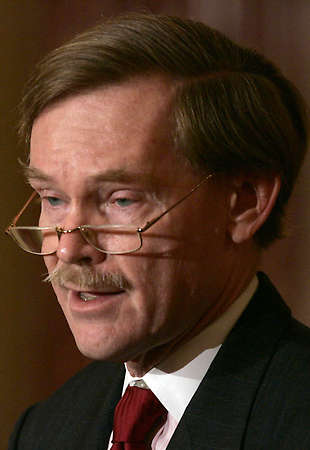The United States of America’s choice for the position of the World Bank President, Robert Zoellick, on Monday secured the endorsement of the board of the global institution as its next president. Zoellick, a seasoned player in international financial and diplomatic circles, won the unanimous approval of the board to become the poverty-fighting institution’s next president. He will succeed Paul Wolfowitz, whose last day is Saturday, ending a stormy two-year tenure. The new president will take the reins on Sunday, the first day of his five-year term. Wolfowitz courted controversy from the start because of his role in the Iraq war when he was deputy defence secretary. However, it was his role in arranging a hefty pay raise for Shaha Riza, his girlfriend and bank employee, that forced his upcoming departure. That prompted a staff revolt and calls by Europeans and others for Wolfowitz to resign. US, President George Bush turned to Zoellick — his former top trade envoy and number two diplomat–to heal the wounds and mend the relationships strained by the Wolfowitz episode. Zoellick, 53, brings to the World Bank years of experience in the foreign and economic policy arenas under three Republican presidents, starting with Ronald Reagan. Zoellick left the Bush administration last year to become an executive at the Wall Street giant, Goldman Sachs. The board, in a brief statement, said Zoellick brings “strong leadership and managerial qualities as well as a proven track record in international affairs and the drive required to enhance the credibility and effectiveness of the bank.”
As World Bank chief, he will have his work cut out for him. He will need to regain trust, rebuild credibility and mend frayed relations inside the institution as well as with its member countries worldwide. He will also need to persuade countries to contribute nearly $30bn over the next few years to fund a centerpiece bank program that provides interest-free loans to the world’s poorest countries. The board said it was confident that Zoellick would be able to “address the challenges facing the bank.” To begin the healing process, Zoellick took a two-week global tour to Africa, Europe and Latin America. His goals were listening and learning, he said. He’s also been working to keep lines of communications open with the board. Zoellick met with the board for around four hours last Wednesday to discuss key issues, including challenges of development, the bank’s governance and leadership as well as future strategic directions. Oxfam International, an anti-poverty group, called on Zoellick to be a bold reformer — including getting rid of some strings attached to bank lending and overhauling the bank’s governance structure. “Zoellick must begin a series of reforms in his first 100 days to create a new deal between the bank and the world’s poor. We can’t continue with business as usual,” said Jeremy Hobbs, Oxfam’s executive director. Wolfowitz had waged a vigorous battle to save his job. He was all but forced out, however, by the finding of a special bank panel that he violated conflict-of-interest rules in his handling of Riza’s pay package. The whole matter was seen as a growing liability that threatened to tarnish the institution’s reputation and hobble its ability to persuade countries around the world to contribute billions of dollars to provide financial assistance to poor nations.
|
|---|
